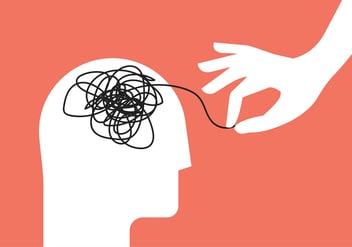Loss is excruciatingly difficult. There’s no other way to put it.
Even knowing that 15% to 20% of those who lose someone will experience complicated grief—extensive grief that is ultra-overwhelming and seems to have no end— doesn’t help ease the pain or fill the hole that loss leaves. And that’s completely okay and normal.
Below we’ve provided some advice to help both those who have lost someone and want to talk and those who are caring for someone who has lost a loved one survive grief.
As a final reminder before jumping in, every grief journey is different and takes time. Don’t rush it or compare it to anybody else’s.
Part A: If You’ve Lost Someone You Love…..
First, we want to say how sorry we are for your loss. We can imagine the pain and heartbreak you’re dealing with. Second, we want to celebrate you for being open to talking about it and encourage you to find a safe person to talk with. While we can’t know everything about what you’re going through, we do hope that these tips below will help you as you grieve and survive the grief you're experiencing.
Find a Safe Space
A key part of opening up is finding a safe person to talk to or a safe space to open up. Some characteristics of a safe person might include: caring and compassionate, a good listener, trustworthy, patient, supportive, empathetic and understanding. Characteristics of a safe space might also include: open and non-judgmental, comfortable, welcoming, and kind.
As far as who to open up to, there are many different options depending on your circumstances and what you feel comfortable with. People such as friends, a family member, your neighbor, your mentor, or a member or pastor at your church can all be great places to start. If you feel you need more professional-type help, counselors and grief groups are safe spaces for you to talk and process what you’re going through. Whoever you choose, we recommend finding 1-3 trusted people to go deep with rather than spreading yourself thin by opening up to everyone you know in your life. This will often help you process and manage things better.
Don’t Rush Grieving
The biggest thing to remember when you’re grieving is that everyone is different. Just because someone you know, or someone you saw on TV or online dealt with it in a certain way doesn’t mean you need to or that it will work for you.
While it is important to talk to someone and not bottle it up, it’s also okay if you’re not quite ready yet. Or if you think you’re ready to talk about “x”, but when you actually get there, you realize you’re not. Remember, there is no timeline for grieving, no perfect path towards healing. Find healthy coping mechanisms that work for you. And even if you’re not ready to talk, surrounding yourself with others so you’re not isolating can still be a great option.
Don’t Be Afraid to Show Emotion
Emotions are important, not something for us to keep hidden or pushed down beneath the surface. In fact, emotions prepare us for behavior.1 Allowing our bodies and minds to let that emotion out—in a safe and healthy way—actually helps us let go of the pain and emotion we’re feeling. But when we suppress those feelings, and therefore don’t express them in healthy manners, they only cause a bigger disruption later down the line.
When looking at the 5 stages of grief—denial, anger, bargaining, depression, acceptance—there’s lots of emotions in each of those. They’re meant to be acknowledged, expressed, and worked through, not buried down deep. When talking with someone about loss, it’s important to be able to show your emotions and process them. As long as you are respecting boundaries and expressing your emotions in a safe, healthy way, you don’t need to apologize for crying, saying what you’re angry about, yelling, panicking, questioning, etc. Letting those out can be a very cathartic step on your path towards healing.
Be Honest
The only way you can move forward in life after loss is being honest with those in your life. And the first step to being honest with them is being honest with yourself. Be honest with yourself about how you’re feeling, what you’re struggling with, and what you may need going into a conversation with someone else. Getting comfortable with this knowledge will make it easier for people who love you to help you.
When you go into a conversation, telling someone what you need can help that person better serve and be there for you. Don’t be afraid to speak up if you know what will be useful or what you need. If you want advice, ask! If you just need someone to listen and not talk, let them know that. Tell them if you want to share stories about your loved one or if just sitting there and crying is what you’re looking for.
This can also apply if you know something specific you need. Whether it be childcare help, meals, someone to stay with you, financial help, or something else, the people in your life want to help you however they can. Don’t be afraid to be honest about what those things may be.
With that said, at the same time, “I don’t know” is absolutely okay too. There is no pressure for you to provide this long list of things you need or to know exactly how someone can help. If this is the case, let people love you how they can. But if you do have an idea, be honest with yourself and that person about what you need.
Part B: If You Know a Person Who Has Lost Someone…
If this is you, we love that you want to talk to, be there for, and support someone who lost a loved one. It’s not easy, but it is so important. We hope these tips will give you a foundation for walking with that person through their grief journey.
Be Compassionate & Empathetic
Maybe you too have lost someone you love or maybe you have absolutely no idea the pain someone is going through…either way, compassion and empathy can go a long way. Losing a loved one piles on a lot of pain—emotionally, relationally, mentally, spiritually, sometimes even physically. Sometimes they might not know how to express or process that depth of pain. So be kind and patient with them as they navigate their grief.
Don’t place high expectations on them; this might only add to the pain. It’s important to remember here that what might seem ‘normal’ expectations to you, may actually be really difficult for them to do. Move your expectations to fit their reality, not yours.
Lastly, do not minimize their pain. Sometimes even well-meaning phrases can be seen as belittling their pain or diminishing what they’re going through. Phrases such as:
- “At least you still have “x” person in your life”
- “At least he/she wasn’t in pain”
- Platitudes such as “time heals everything” or “everything happens for a reason”
While you may think you’re helping them to look on the bright side, 99% of the time, those words aren’t helpful. It may make it seem like you are minimizing their pain, even if that’s not your intention.
You Don't Need All the Answers
Of course, being compassionate and emphatic doesn’t mean you have to stay completely silent. If you want to say something, and it seems appropriate, go for it! Some things you could say are expressing how sorry you are for their loss or phrases such as “I imagine you’re in so much pain”, “I know it must be so hard” or “you must feel so empty right now”, etc. Another great tool is asking questions.
With that said, don’t feel like you have to say the “perfect” or “right” thing nor do you need all the answers to give. More often than not presence > profound wisdom. This person is likely not going to you for all the answers but rather for support and love. And if they are looking to you for answers, help them find a professional who can better assist.
Talking is such a great gift you can give someone going through loss. But more times than not, your presence is all that’s needed. Simply being there for them—even if it’s sitting in silence or lending a listening ear, can make a world of a difference.
Give Options
We know how badly you want to help this grieving person in your life…but where do you even start? You can definitely ask them, but sometimes hurting people don’t know what they need or how you can help. And feeling like they ‘need’ to come up with something may overwhelm them.
So, instead, we recommend you provide some options of ways you can help. Providing 2-3 things to the person and allowing them to choose which sounds best can actually be a loving way to be there for someone in their darkest times. Just be sure these are tangible things that you can provide. You don’t want to offer something that you wouldn’t be able to follow through on. Below are some examples to get you started:
- Start a meal train
- Make them a meal or set up food to be delivered to their place
- Clean their house or apartment
- Help them with chores such as dishes or laundry 2/week
- Childcare duties
- Stop by and pick them up to take them to dinner, coffee, ice cream, a bookstore, etc.
Allow Them to Grieve
Everyone goes through the stages of grief and processes loss differently. How you or another friend or someone on TV experiences it may not be how this person does. The best way you can be there for someone is to allow them to grieve how they need to. (Within reason—if you believe someone is harming themselves or others, reaching out for professional help is best).
Give this person space, but also keep in touch—even if they don’t always respond. You don’t have to stop being there for them, but you also don’t want to suffocate them either. And most importantly, keep showing up however you can. Be there for them when and how they’re ready.
Set Healthy Boundaries
As we said at the beginning, being there for someone who has lost a loved one can be difficult and take a toll on you as well. That’s why it’s also important that you create and set healthy boundaries for yourself. Set boundaries that give you time and space to relax, unwind, fill up, and take care of yourself. Don’t be afraid to ask for help yourself—either from others in your life, their life, or from a professional if needed. You can’t be there for them well if you aren’t showing up for yourself first.
If you’ve lost a loved one, we hope these tips can help you begin to open up and talk to someone about it. Maybe even pass this along to whomever is walking through your loss with you. And if you’re helping someone through loss, we hope these points give you a good foundation for being there for that person.
To those experiencing loss, we are so sorry. If you’re looking for a safe place to talk about your grief with someone who is caring, trustworthy, supportive, and empathetic, we’d love to help. You can click below to get connected with someone who can and will walk with you through this journey.
....................................
1: NOBA (https://nobaproject.com/modules/functions-of-emotions)




